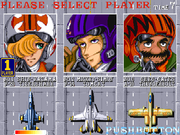| Revision as of 21:23, 29 May 2015 editDissident93 (talk | contribs)Extended confirmed users, Rollbackers, Template editors154,584 edits SNES version was just ports of the original tracks, and Takashi Tateishi just did one theme← Previous edit | Revision as of 21:26, 29 May 2015 edit undoDissident93 (talk | contribs)Extended confirmed users, Rollbackers, Template editors154,584 editsNo edit summaryNext edit → | ||
| Line 19: | Line 19: | ||
| |display = ], 384 x 224 pixels (Horizontal), 4096 colors | |display = ], 384 x 224 pixels (Horizontal), 4096 colors | ||
| }} | }} | ||
| '''''U.N. Squadron''''' is a {{vgy|1989}} ] released by ] for the ] ] hardware and for the ] |
'''''U.N. Squadron''''' is a {{vgy|1989}} ] released by ] for the ] ] hardware and for the ]. The game was released in ] as {{Nihongo|'''''Area 88'''''|エリア88|Eria Hachi-Jū-Hachi|lead=yes}} and is based on the ] series of the ], featuring the same main characters. Here, their mission is to stop a terrorist group known as Project 4. It was followed by the sequel '']''. | ||
| ==Gameplay== | ==Gameplay== | ||
Revision as of 21:26, 29 May 2015
| This article needs additional citations for verification. Please help improve this article by adding citations to reliable sources. Unsourced material may be challenged and removed. Find sources: "U.N. Squadron" – news · newspapers · books · scholar · JSTOR (April 2009) (Learn how and when to remove this message) |
| U.N. Squadron | |
|---|---|
 Sales flyer for the arcade version. Sales flyer for the arcade version. | |
| Developer(s) | Capcom |
| Publisher(s) | Capcom |
| Composer(s) | Manami Matsumae |
| Platform(s) | Arcade, Amiga, Amstrad CPC, Atari ST, Commodore 64, SNES, ZX Spectrum |
| Release | August Template:Vgy SNES |
| Genre(s) | Scrolling shooter |
| Mode(s) | 1 player |
| Arcade system | CPS-1 |
U.N. Squadron is a Template:Vgy side-scrolling shooting game released by Capcom for the CPS arcade hardware and for the Super Nintendo Entertainment System. The game was released in Japan as Area 88 (Japanese: エリア88, Hepburn: Eria Hachi-Jū-Hachi) and is based on the manga series of the same name, featuring the same main characters. Here, their mission is to stop a terrorist group known as Project 4. It was followed by the sequel Carrier Air Wing.
Gameplay

The game is a typical side scrolling shooter, going against the trend of other Capcom shooters, such as 1942, and 1943: The Battle of Midway, which are vertically scrolling shooters. However, like other Capcom shooters, the player has an energy bar that is consumed over the course of a single life as the player sustains damage. This trait is highly uncommon among other comparable arcade-style shooters which normally use a system of reserve lives, where one of which is lost upon a single enemy hit. Before entering a level, the player has the opportunity to purchase special weapons or added defenses in the shop. The player earns money to buy weapons by destroying enemy planes and vehicles during levels and, when the level is finished, any unused weapons are converted back into money.
The player can choose between three mercenary pilots: Shin Kazama, Mickey Simon, and Greg Gates. Each pilot flies a specific plane and has slightly different capabilities.
The game was converted to the Super Nintendo Entertainment System and Super Famicom in 1991. Unlike in the arcade version, each pilot can use a range of planes. All pilots start out with $3000 and the basic F8 Crusader, and can buy other aircraft as they progress.
Reception
IGN ranked U.N. Squadron 37th on their "Top 100 Super Nintendo Games" list, which made it the highest ranking side scroller shooter game on that list.
References
- "Super NES Games" (PDF). Nintendo. Retrieved 2012-07-25.
- ^ "U.N. Squadron Release Data". GameFAQs. Retrieved 2013-06-15.
- UN Squadron - #37 Top 100 SNES Games - IGN
External links
- U.N. Squadron at Arcade-History
- Area 88 at the Killer List of Videogames
- U.N. Squadron at MobyGames
- U.N. Squadron at the Killer List of Videogames
- UN Squadron SNES review from Mean Machines Archive
- Area 88 review at the Anime Super Famicom Web Resource Center
| Area 88 by Kaoru Shintani | |
|---|---|